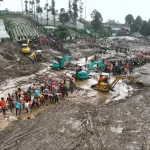BROKER & UNDERWRITER SYNERGY SERIES (BUSS) EDISI 1
Liga Asuransi – Jakarta, 24 July 2024 – The Association of Indonesian Insurance and Reinsurance Broker Companies (APPARINDO) held a panel discussion entitled “Where are we going to take premium rates in the insurance industry?” at Opus Ballroom, The Tribrata Convention, South Jakarta. This event was attended by around 100 participants, including insurance brokers, insurance companies, and representatives from the Indonesian Insurance Loss Appraisers Association (APKAI), represented by its president, Capt. Dikarioso.
This discussion panel features senior experts from the general insurance industry and insurance brokers. Among them is Suhardiman Hamid, Technical Director of PT. Jasaraharja Putera Insurance (JRP); Kocu A. Hutagalung, Main Director of PT. Maipark Indonesia Reinsurance (RMI); Wayan Pariama, Director of Zurich Insurance Indonesia (ZII); Djoko Gazali, President Director of PT Mitra Iswara & Rorimpandey (MIR); and Kameswara Natakusumah, President Director of PT Willis Tower Watson IBI (Willis). This discussion was led by Boyke Lukman, Chairman 1 of APPARINDO.
In his opening remarks, the General Chair of APPARINDO, Yulius Bhayangkara (Billy), said that the aim of this event was to achieve a healthy insurance industry “ecosystem” that provides benefits for all industry players. Billy expects the panelists and participants to openly raise their facts and views.
Suhardiman Hamid opened the discussion by explaining the situation before the enactment of OJK Number 6/SEOJK.05/2017, where insurance premium income was inadequate for insurance companies due to tariff wars. He explained that premium income must be “adequate”. AAUI has formed a Tariff Revision Team which is currently conducting a study on the impact of setting these tariffs on the general insurance industry. The team found that of the 375 types of risk included in the rates, some had very high claim ratios. AAUI is building a Data Center for more precise analysis, with plans to publish a new SEOJK in 2024. Suhardiman added that rates are calculated based on Pure Risk, acquisition costs, operational costs, and profits, as well as considering deductibles.
Djoko Gazali believes that premium rates should be calculated based on wise underwriting by each company, taking into account the risk profile and risk management of the insured object, including fire extinguishing facilities, Health, Safety and Environment (HSE) programs, as well as loss experience (loss ratio). ). Djoko also emphasized the importance of reducing scale and preparing for the ASEAN free market or AFTA, where foreign insurance companies can directly offer their services in Indonesia.
Kocu A. Hutagalung explained that the risk of earthquakes is not included in the “accident” category but is a catastrophic risk, and claim reimbursement is “funding”. To accurately measure earthquake risk, long-term data is needed. Currently, there are 250 new faults that have the potential to cause earthquakes, and risk calculations are based on models, not loss ratios.
Premium rates for insurance companies are more important on net premium, while for brokers the focus is on gross premium. The net premium calculation is used to calculate insurance and reinsurance capacity. In Indonesia, premiums are calculated based on tariffs, while in some countries they are based on supply and demand. Kocu also emphasized that premium rates are related to Insurance Premium Reserves (IPR), which most insurance companies in Indonesia depend on for premium income, not capital contributions. This IPR challenge has long been experienced by the Indonesian insurance industry.
Wayan Pariama explained the importance of the Risk Management function in determining premium rates. Multinational insurance companies always prioritize survey reports and conduct surveys of insured objects to understand the actual risk conditions. After that, they provide input and corrections to improve risk quality. This step aims to reduce risk and reduce insurance premium costs. With this approach, insurance companies can ensure that the premium rates set are more accurate and in line with the risk profile, thereby providing better protection for the insured.
Kameswara Natakusumah added that premium rates in Indonesia are often dictated by international reinsurance companies because of our dependence on reinsurance support. To overcome this, the domestic insurance industry needs to increase its own capacity by strengthening the underwriting function, which is the art of assessing and deciding the level of risk of an object. He emphasized the importance of assessing premiums based on underwriting results, not generalization of predetermined rates. Kameswara also underlined that dependence on foreign funds hinders the independence of the Indonesian insurance industry.
In the discussion that took place further, the panelists delved deeper into the impact of premium rate policies on various aspects of the insurance industry. They highlight the importance of a data-driven approach in determining appropriate premium rates, which reflect the real risks faced by insurance companies. Suhardiman Hamid emphasized that accurate and comprehensive data is very important in building effective and fair tariff policies.
Djoko Gazali also emphasized that transparency in the underwriting process is very important to ensure that the premium rates set are in accordance with the risk profile of the object being insured. He suggested that insurance companies increase investment in technology and risk management systems to obtain more accurate and in-depth data about the risks they face.
Kocu A. Hutagalung added that knowledge about geological risks, such as earthquakes, must continue to be updated with the latest data and more sophisticated predictive models. This will help insurance companies assess risks more accurately and set more realistic premium rates.
Panelists also discussed the main challenges faced by the insurance industry in Indonesia, including dependence on international reinsurance and the need to increase domestic insurance capacity. Kameswara Natakusumah emphasized the importance of building strong underwriting capacity domestically to reduce dependence on foreign reinsurance. He suggested that Indonesian insurance companies increase training and development of human resources in the fields of underwriting and risk management.
The panelists agreed that collaboration between insurance companies, insurance brokers and regulators is critical to creating an ecosystem that supports the healthy and sustainable growth of the insurance industry. They also emphasized the important role of technology in increasing efficiency and accuracy in risk assessment and premium rate setting.
This discussion highlights the need for ongoing evaluation of premium rate policies to ensure they are appropriate to industry growth and market needs. APPARINDO is committed to continuing to champion policies and practices that drive the progress of the insurance industry, ensure greater utilization of insurance brokers, and provide better services for all stakeholders.
The discussion participants agreed on several concrete steps that would be taken to overcome the challenges faced by the insurance industry in Indonesia. One of them is strengthening collaboration between insurance companies and insurance brokers to develop insurance products that are more innovative and in line with market needs.
APPARINDO also plans to continue holding regular discussions and seminars to discuss current issues in the insurance industry and find joint solutions to improve service quality and public trust in the insurance industry.
With strong commitment from all parties involved, it is hoped that the insurance industry in Indonesia will continue to grow and develop, providing better protection for the community and a greater contribution to the national economy.
This event is an important first step in APPARINDO’s efforts to create a healthy and sustainable insurance industry ecosystem. With constructive discussions and close collaboration between all parties involved, the insurance industry in Indonesia can achieve better growth and provide greater benefits for all stakeholders.
—
This article is brought to you by Insurance Broker L&G Insurance Broker.
—
LOOKING FOR INSURANCE PRODUCTS? DON’T WASTE YOUR TIME AND CONTACT US NOW
24 JAM L&G HOTLINE: 0811-8507-773 (CALL – WHATSAPP – SMS)
Website: lngrisk.co.id
Email: customer.service@lngrisk.co.id
—














